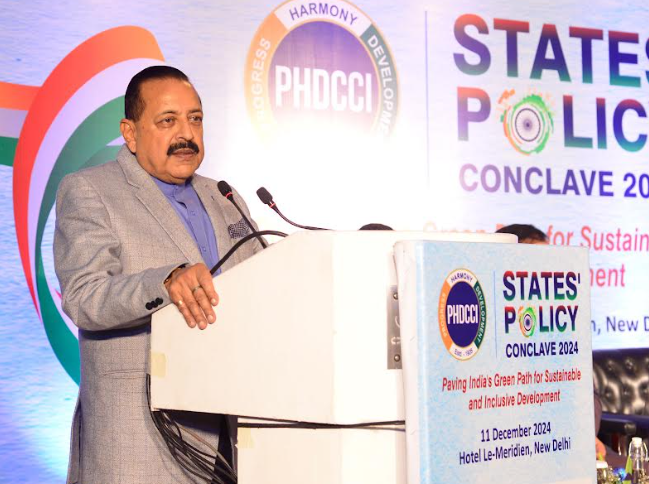Collaboration between States, Central Government and Private Sector is a key to progress, says Dr Jitendra Singh, Hon’ble Minister of State (Independent Charge) of the Ministry of Earth Sciences; Minister of State (Independent Charge) of Science & Technology; Minister of State in the Prime Minister’s Office; Minister of State in the Ministry of Personnel, Public Grievance, Government of India at PHDCCI’s States’ Policy Conclave 2024
For the growth story, it is important to explore unexplored areas, India has unique domains that have remained untapped for the last 6-7 decades- one such area is our marine resources. With one of the longest coastlines in the world, pairing coastal states can bring great benefits, Said, Dr Jitendra Singh, Hon’ble Minister of State (Independent Charge) of the Ministry of Earth Sciences; Minister of State (Independent Charge) of Science & Technology; Minister of State in the Prime Minister’s Office; Minister of State in the Ministry of Personnel, Public Grievance, Government of India at PHDCCI’s States’ Policy Conclave 2024 under the theme Paving India’s Green Path for Sustainable and Inclusive Development held today at Hotel Le-Meridien, New Delhi
He further added that Indian states have a huge source of wealth, including metals, minerals, fisheries, and biodiversity. India’s political environment is also very enabling and our Hon’ble Prime Minister is very proactive and involved. Another resource is the Himalayan region, while we mostly talk about IT capabilities; the 4-5 states in the Himalayas’ lap have immense potential. This government has recognized it, for example, the Purple Revolution was showcased in the January 26th parade. There are around 3,000 lavender startups, many run by people who are not even graduates, we need to clear these myths. The Deep Sea Mission for marine resources was mentioned by the Prime Minister in his 2022 and 2023 Independence Day addresses.
Further the minister added that it is important to establish industry linkages from the very beginning. The industry should map out the necessary projects, and we should design our systems accordingly for sustainability. Today, India has around 1.7 lakh startups. The Startup India, Stand Up India initiative is a huge success story because of effective linkages. Our vaccine success story is another example of collaboration with the industry. The National Research Foundation has now decided that 70% of resources will come from the non-government sector. We need to couple states, adopt an integrated approach between the states and the central government, and eliminate skepticism between the government and the private sector.
Dr Shamika Ravi, Member, Economic Advisory Council to the Prime Minister (EAC-PM) & Secretary, Government of India, outlined the need for policy intervention. She mentioned that lifestyle changes will eventually become mandatory, while individuals act for their benefit, collective action often lags behind. When there is dissonance, laws and policies become necessary. Though sustainable initiatives may seem expensive, they are economically beneficial. Many states are already taking action, for example, Madhya Pradesh measures its green cover, and Meghalaya is also taking similar initiatives.
She further added, growth requires a certain cost, In Europe, the conversation revolves around degrowth, but that is not an agenda for India, hence every state must continue to grow. Since not all states are poised for similar growth, we must consider green GDP and new models of growth, valuing green cover and biodiversity. There is significant potential for innovation in these areas. States that preserve forests should be compensated, as they do not all have the same growth opportunities.
Mr Sanjay Kumar Mishra, Additional Secretary, Department of AYUSH Department & Secretary-CEO, Madhya Pradesh State Medicinal Plants Board (MPSMPB), Government of Madhya Pradesh stated that MP and Chhattisgarh are powerhouses of solar energy and are also making significant strides toward economic development.
He further informed that during COVID-19, more than 2 lakh tourists visited Madhya Pradesh, and more than 20,000 visited Panna Tiger Reserve. He mentioned that 64% of the districts have forest cover and under the government policy it is mandatory to maintain 33% forest cover across the country and MP is close to this target, with 31% forest cover currently.

Ms Ritu Sain, Investment Commissioner, Government of Chhattisgarh emphasized that sustainability and inclusion are no longer aspirations but necessities. She said that sustainability and inclusion must be integrated into both policy and practice.
She further informed that 54% of the state’s GDP comes from the industrial sector, the per capita income is lower than the national average. However, Chhattisgarh ranks number one in the production of steel and power. It is home to 3 crore people and is the ninth-largest state in India. It is not only affordable but also sustainable, and by investing here, you become part of transforming the lives of those who are yet to experience growth.
She added, land here is cheap and accessible as the region has 5,000 acres of land that is power-surplus, has easily available water, and a workforce that is not only affordable but also skilled for business. Hence, it holds significant potential for investment.
She also discussed the development of Naya Raipur Smart City and added that the state has a new, aggressive developmental policy. Chhattisgarh is ready to become the next investment destination, offering the right policy environment and ecosystem essential for sustainable business, concluded Ms. Sain.
Mr Anil Gupta, Vice President, PHDCCI said that over the years, PHDCCI’s “States’ Policy Conclave” has been offering a remarkable platform to the key stakeholders in the government and industry to make interface for effective public policy dialogues besides creating a sustained basis of enhancing the governance and investment ecosystem in states.
At PHDCCI, we are very much encouraged with the progressive stance of the government on policy matters. It’s also appreciable how PHDCCI has closely worked with the Government of Chhattisgarh for the state’s newly-launched “Industrial Policy” that surely promises to support the greater government-industry collaboration for sustainable industrialisation. From the PHDCCI industry fraternity, I assure the Government of Chhattisgarh to further explore Chhattisgarh as an investment destination, he said.
Dr Ranjeet Mehta, CEO & Secretary General, PHDCCI discussed that the State Policy Conclave is a transformative platform where we discuss state-specific opportunities and how we align these with national goals. Today, we are delighted to have the state of Chhattisgarh on board, as it has immense potential for development. It is a new emerging state where people look for opportunities and investments, and the government is very proactive.
He added, this year’s theme addresses one of the biggest challenges- climate change. The world is changing very fast, and it is important to keep pace with the changing times. Sustainability is very important, and it is at the core of every development. Reducing carbon emissions by 45% by 2030 is crucial, mechanisms like CBAM will play a significant role. To develop further, we need to adapt to green technology, and since India is a developing economy, we need to ensure the growth is inclusive. We are in a unique position globally, being one of the greatest economies. Therefore, states are also important, as each state has unique potential.
Mr Amitabh Ranjan, Registrar, Indian Institute of Public Administration, Government of India discussed the need to scale down fossil fuels and scale up the transition to renewable energy while maintaining sustainable growth. He highlighted opportunities in green jobs within sectors like renewable energy, nuclear energy, hydropower, and solar energy.
Mr Bishal Thapa, Senior Director (India), CLASP discussed the critical role states can play in climate change and energy transition, as they defines the strength of the country. We face an unprecedented challenge, and to get back on track, the world needs to cut its emissions by 42% by 2030 and 57% by 2035. India has a very unique federal structure and is well-positioned based on competition and collaboration. Therefore, states play an important role, and it is their responsibility to introduce policies to reduce emissions and enable people to adapt to climate change. States also have a moral responsibility to ensure that their people remain resilient.
The success of measures to reduce emissions, adapt, and increase resilience depends entirely on state policies. Implementing energy-reducing policies will help improve access, increase productivity, and enhance livelihoods, he added.
Mr Anand Jha, Vice President (Head of Government: India & South Asia), Visa discussed Visa company’s history. He mentioned its two key priorities- first is unemployment – Visa has partnered with the Ministry of Skill Development to train 20,000 people associated with the tourism sector across India. Second, digital payments as the RBI launched a program to adopt 75 villages and convert them into digital payment-enabled villages.
He further added, Visa has adopted around 1,000 villages and suggested that all financial companies should adopt villages to teach digital technologies and tools. He emphasized that sustainability is not just a government issue but a concern for everyone. Further, Visa is trying to partner with state tourism ministries.
The conclave also marked the release of PHDCCI’s “States’ Performance Indicator Report Paving India’s Green Path for Sustainable and Inclusive Development.” A comprehensive report highlighting how states play a pivotal role in the overall growth and development of India’s economy.
The Conclave was supported by Visa, Varun Beverages, CSIDC Ltd, Chhattisgarh; Ayush Dept., Govt. of Madhya Pradesh Govt. and Invest India along with PHDCCI annual sponsors, DLF Ltd; Jindal Steel & Power; KLJ Group; Multani Pharmaceuticals Ltd; Marble City; MMG Group; Radico Khaitan Ltd; Uflex Ltd; Vestige; Eazy ERP Technologies; JK Tyre & Industries Ltd; Sagar Group of Industries; Superior Industries Limited; Samsung India Electronics; Oswal Greentech; Apeejay Stya Group; Blossom Kochhar Beauty Products Pvt Ltd; DCM Shriram; R E Rogers; Trident Group; Ajit Industries Pvt Ltd; Bhagwati Plastic and Pipes Industries; Central Coalfields Ltd; DD Pharmaceutical Ltd.; Hindware Sanitary; Jindal Steel; Modern Automobiles; P S BEDI & Co.


+ There are no comments
Add yours